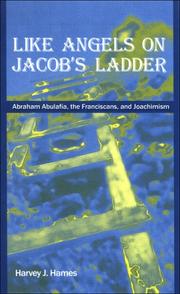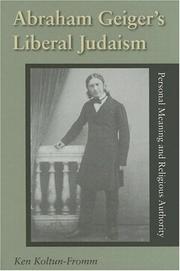| Listing 1 - 10 of 37 | << page >> |
Sort by
|
Book
ISBN: 9780827614819 0827614810 9780827613638 0827613636 Year: 2018 Publisher: Philadelphia : Lincoln : The Jewish Publication Society ; University of Nebraska Press,
Abstract | Keywords | Export | Availability | Bookmark
 Loading...
Loading...Choose an application
- Reference Manager
- EndNote
- RefWorks (Direct export to RefWorks)
Bible. --- Ḥayyei Sarah --- Parashat Elʻazar ʻeved Avraham --- Parashat Eliʻezer ʻeved Avraham --- Parashat Ḥaye Śarah --- Parashat Ḥayyei Sarah
Book
ISBN: 1315691043 1317428935 1317428927 9781317428930 9781315691046 9781138914032 1138914037 Year: 2016 Publisher: London ; New York : Routledge,
Abstract | Keywords | Export | Availability | Bookmark
 Loading...
Loading...Choose an application
- Reference Manager
- EndNote
- RefWorks (Direct export to RefWorks)
Mysticism --- Sufism. --- Judaism --- Islam --- Jewish-Arab relations --- Judaism. --- Islam. --- Relations --- Derekh Avraham Order.
Book
ISBN: 9004280812 9789004280816 9789004280809 9004280804 1322872821 Year: 2015 Publisher: Leiden, The Netherlands : Koninklijke Brill,
Abstract | Keywords | Export | Availability | Bookmark
 Loading...
Loading...Choose an application
- Reference Manager
- EndNote
- RefWorks (Direct export to RefWorks)
Avi Sagi is Professor of Philosophy at Bar Ilan University in Ramat Gan, Israel, and Senior Fellow at the Shalom Hartman Institute in Jerusalem, Israel. A philosopher, literary critic, scholar of cultural studies, historian and philosopher of halakhah, public intellectual, social critic, and educator, Sagi has written most lucidly on the challenges that face humanity, Judaism, and Israeli society today. As an intertextual thinker, Sagi integrates numerous strands within contemporary philosophy, while critically engaging Jewish and non-Jewish philosophers. Offering an insightful defense of pluralism and multiculturalism, his numerous writings integrate philosophy, religion, theology, jurisprudence, psychology, art, literature, and politics, charting a new path for Jewish thought in the twenty-first century.
Jewish philosophy. --- Philosophy --- Mental philosophy --- Humanities --- Jews --- Philosophy, Jewish --- Philosophy, Israeli --- Sagi, Abraham --- Śagi, Avi --- Śagi, Avraham --- Schweitzer, Abraham --- Shṿaitser, Avraham --- שגיא, אברהם --- שגיא, אבי --- שגיא, צבי --- Philosophy.

ISBN: 0791479188 143563294X 9781435632943 9780791479186 079147271X 9780791472712 9780791479186 Year: 2007 Publisher: Albany : State University of New York Press,
Abstract | Keywords | Export | Availability | Bookmark
 Loading...
Loading...Choose an application
- Reference Manager
- EndNote
- RefWorks (Direct export to RefWorks)
This book explores the career of Abraham Abulafia (ca. 1240–1291), self-proclaimed Messiah and founder of the school of ecstatic Kabbalah. Active in southern Italy and Sicily where Franciscans had adopted the apocalyptic teachings of Joachim of Fiore, Abulafia believed the end of days was approaching and saw himself as chosen by God to reveal the Divine truth. He appropriated Joachite ideas, fusing them with his own revelations, to create an apocalyptic and messianic scenario that he was certain would attract his Jewish contemporaries and hoped would also convince Christians. From his focus on the centrality of the Tetragrammaton (the four letter ineffable Divine name) to the date of the expected redemption in 1290 and the coming together of Jews and Gentiles in the inclusiveness of the new age, Abulafia's engagement with the apocalyptic teachings of some of his Franciscan contemporaries enriched his own worldview. Though his messianic claims were a result of his revelatory experiences and hermeneutical reading of the Torah, they were, to no small extent, dependent on his historical circumstances and acculturation.
History --- Judaism --- Salvation. --- Ecstasy (Judaism) --- Cabala --- Brotherhood Week --- Salvation --- Religion --- Mysticism --- Religious aspects --- Christianity --- History of doctrines --- Relations --- Christianity. --- History. --- Joachim, --- Abulafia, Abraham ben Samuel, --- Fiore, Gioacchino da, --- Fiore, Joachim von, --- Gioacchino, --- Gioachino, --- Joachimus, --- Pseudo-Joachim, --- Aboulafia, Abraham, --- Abraham ben Samuel Abu-lʹ-afyah, --- Abu-lʹ-afyah, Abraham ben Samuel, --- Abulafia, Abraham, --- Abulʼafya, Avraham, --- Abulʼafya, Avraham ben Shemuʼel, --- Abulʼafyah, Avraham, --- Avraham, --- אבולעפיא, אברהם --- אבולעפיא, אברהם בן שמואל --- אבולעפיא, אברהם בן שמואל, --- אבולעפיה, אברהם --- אבולעפיה, אברהם, --- אבולעפיה, אברהם בן שמואל --- אבולעפיה, אברהם בן שמואל, --- אבולעפיה, אברהם. כהן, רפאל --- Kabbale --- Extase --- Salut --- Judaïsme --- Histoire --- Christianisme --- Aspect religieux --- Histoire des doctrines
Book
ISBN: 1283120631 9786613120632 9004194479 9789004194472 9789004194465 9004194460 Year: 2011 Publisher: Leiden [Netherlands] ; Boston : Brill,
Abstract | Keywords | Export | Availability | Bookmark
 Loading...
Loading...Choose an application
- Reference Manager
- EndNote
- RefWorks (Direct export to RefWorks)
Abraham Abulafia (1240 – c. 1291) founded an enormously influential branch of Jewish mysticism, referred to as the prophetic or ecstatic kabbalah. This book, from several perspectives, explores the impact of Christianity upon Abulafia. His copious writings evince an intense fascination with Christian themes, yet Abulafia’s frequent diatribes against Jesus and Christianity reveal him to be deeply conflicted in his relationship to his southern European religious neighbors. This book undertakes a careful study of Abulafia’s writings, suggesting that the recognition of an inner dynamic of attraction and revulsion toward the forbidden other provides a crucial key to understanding Abulafia’s mystical hermeneutic and his meditative practice. It also demonstrates that Abulafia's uneasy relationship to Christianity shaped the very core of his mystical doctrine.
Cabala. --- Christianity and other religions --- Judaism --- Brotherhood Week --- Cabbala --- Jews --- Kábala --- Kabalah --- Kabbala --- Kabbalah --- Qabalah --- Jewish literature --- Magic --- Mysticism --- Judaism. --- Relations --- Christianity. --- Cabala --- Abulafia, Abraham ben Samuel, --- Aboulafia, Abraham, --- Abraham ben Samuel Abu-lʹ-afyah, --- Abu-lʹ-afyah, Abraham ben Samuel, --- Abulafia, Abraham, --- Abulʼafya, Avraham, --- Abulʼafya, Avraham ben Shemuʼel, --- Abulʼafyah, Avraham, --- Avraham, --- אבולעפיא, אברהם --- אבולעפיא, אברהם בן שמואל --- אבולעפיא, אברהם בן שמואל, --- אבולעפיה, אברהם --- אבולעפיה, אברהם, --- אבולעפיה, אברהם בן שמואל --- אבולעפיה, אברהם בן שמואל, --- אבולעפיה, אברהם. כהן, רפאל --- Religion. --- Cabala and Christianity. --- Kabbale --- Kabbale et christianisme --- Judaïsme --- Christianisme --- History --- Christianity --- Histoire
Book
ISBN: 1618119540 1618119532 9781618119544 Year: 2021 Publisher: Boston, MA : Academic Studies Press,
Abstract | Keywords | Export | Availability | Bookmark
 Loading...
Loading...Choose an application
- Reference Manager
- EndNote
- RefWorks (Direct export to RefWorks)
An exploration of Rav Kook's formative years in Eastern Europe, 1865-1904.
Jewish philosophy. --- Rabbis --- Religious Zionism --- Philosophy. --- Avraham Yitzhaq Ha-Cohen Kook. --- Chief Rabbinate. --- Kabbalah. --- Modern Jewish history and thought. --- Rav Kook. --- Religious Zionism.

ISBN: 9786612072765 1282072765 0253111854 1433708493 9780253111852 9780253347442 0253347440 9781282072763 0253347440 Year: 2006 Publisher: Bloomington : Indiana University Press,
Abstract | Keywords | Export | Availability | Bookmark
 Loading...
Loading...Choose an application
- Reference Manager
- EndNote
- RefWorks (Direct export to RefWorks)
German rabbi, scholar, and theologian Abraham Geiger (1810--1874) is recognized as the principal leader of the Reform movement in German Judaism. In his new work, Ken Koltun-Fromm argues that for Geiger personal meaning in religion -- rather than rote ritual practice or acceptance of dogma -- was the key to religion's moral authority. In five chapters, the book explores issues central to Geiger's work that speak to contemporary Jewish practice -- historical memory, biblical interpretation, ritual and g
Meaning (Philosophy) --- Authority --- Reform Judaism. --- Judaism --- Judaism, Reform --- Liberal Judaism --- Jewish sects --- Religious aspects --- Judaism. --- Reform movement --- Geiger, Abraham, --- Gaiger, Avraham, --- גייגער, אברהם, --- גייגר, אברהם --- גייגר, אברהם, --- גײגר, אברהם, --- Teachings.
Book
ISBN: 1283101912 9786613101914 0300155875 9780300155877 9780300126266 0300126263 9781283101912 6613101915 Year: 2011 Publisher: New Haven [Conn.] : Yale University Press,
Abstract | Keywords | Export | Availability | Bookmark
 Loading...
Loading...Choose an application
- Reference Manager
- EndNote
- RefWorks (Direct export to RefWorks)
This sweeping survey of the history of Kabbalah in Italy represents a major contribution from one of the world's foremost Kabbalah scholars. The first to focus attention on a specific center of Kabbalah, Moshe Idel charts the ways that Kabbalistic thought and literature developed in Italy and how its unique geographical situation facilitated the arrival of both Spanish and Byzantine Kabbalah.Idel analyzes the work of three major Kabbalists-Abraham Abulafia, Menahem Recanati, and Yohanan Alemanno-who represent diverse schools of thought: the ecstatic, the theosophical-theurgical, and the astromagical. Directing special attention to the interactions and tensions among these forms of Jewish Kabbalah and the nascent Christian Kabbalah, Idel brings to light the rich history of Kabbalah in Italy and the powerful influence of this important center on the emergence of Christian Kabbalah and European occultism in general.
Cabala --- Mysticism --- Cabbala --- Jews --- Kábala --- Kabalah --- Kabbala --- Kabbalah --- Qabalah --- Jewish literature --- Magic --- History. --- Judaism --- Abulafia, Abraham ben Samuel, --- Recanati, Menahem ben Benjamin, --- Menaḥem, --- Reḳanaṭi, Menaḥem, --- רקאנטי, מנחם --- רקנאטי, מנחם בן בנימן, --- רקנאטי, מנחם, --- רקנטי, מנחם --- רקנטי, מנחם בן בנימין, --- ריקאנאטי, מנחם, --- ריקאנתי, מנחם --- ריקאנטי, מנחם בן בנימין, --- מנחם רקנט --- מנחם, --- Aboulafia, Abraham, --- Abraham ben Samuel Abu-lʹ-afyah, --- Abu-lʹ-afyah, Abraham ben Samuel, --- Abulafia, Abraham, --- Abulʼafya, Avraham, --- Abulʼafya, Avraham ben Shemuʼel, --- Abulʼafyah, Avraham, --- Avraham, --- אבולעפיא, אברהם --- אבולעפיא, אברהם בן שמואל --- אבולעפיא, אברהם בן שמואל, --- אבולעפיה, אברהם --- אבולעפיה, אברהם, --- אבולעפיה, אברהם בן שמואל --- אבולעפיה, אברהם בן שמואל, --- אבולעפיה, אברהם. כהן, רפאל --- Recanati, Menahem ben Benjamin --- Reḳanaṭi, Menaḥem
Book
ISBN: 1644697068 164469705X 9781644697061 9781644697054 9781644697047 1644697041 Year: 2021 Publisher: Boston, MA : Academic Studies Press,
Abstract | Keywords | Export | Availability | Bookmark
 Loading...
Loading...Choose an application
- Reference Manager
- EndNote
- RefWorks (Direct export to RefWorks)
The Ḥayei Adam, an abridged code of Jewish law, was written by Rabbi Avraham Danzig (1748-1820) and was first published in 1810. This code spread quickly throughout Europe, and the demand for it required a second publishing which the author printed in 1818. Beyond a Code of Jewish Law attempts to understand the implicit message of its author and discuss various approaches of its writer to both Judaism and Jewish law. While the Ḥayei Adam without any doubt unveils Rabbi Danzig to be a brilliant rabbinic scholar, with a comprehensive knowledge of Jewish law as well as a coherent and concise system of presentation, it also expresses his great concern for the Jewish community and each individual Jew. Aspects of this concern such as Hasidism, musar, kabbalah, are explored.
Jewish law. --- Judaism --- Rabbis --- Customs and practices. --- Danzig, Abraham ben Jehiel Michal, --- Vilnius (Lithuania) --- European Jewry. --- Hasidism. --- Hayei Adam. --- Mishnah. --- Orthodox Judaism. --- Rabbi Avraham Danzig. --- Rabbinical writings. --- Talmud. --- Torah. --- halakhah. --- kabbalah. --- law. --- religion.
Book
ISBN: 1789628040 1800851065 1789624282 9781789624281 9781904113997 1904113990 9781789628043 9781800851061 Year: 2021 Publisher: London : The Littman Library of Jewish Civilization,
Abstract | Keywords | Export | Availability | Bookmark
 Loading...
Loading...Choose an application
- Reference Manager
- EndNote
- RefWorks (Direct export to RefWorks)
Continuing his contribution to medieval Jewish intellectual history, Haym Soloveitchik focuses here on the radical pietist movement of Hasidei Ashkenaz and its main literary work, 'Sefer Hasidim', and on the writings and personality of the Provençal commentator Ravad of Posquières. In both areas Soloveitchik challenges mainstream views to provide a new understanding of medieval Jewish thought. Some of the essays are revised and updated versions of work previously published and some are entirely new, but in all of them Soloveitchik challenges reigning views to provide a new understanding of medieval Jewish thought.
Jews --- History --- Intellectual life. --- Judah ben Samuel, --- angle of deflection --- Avraham ben David of Posquières --- German Pietists --- German Pietism --- Ḥasidei Ashkenaz --- Ḥokhmat ha-nefesh --- Jews of Provence --- medieval Ashkenaz --- Ravad/Rabad --- Sefer Ḥasidim
| Listing 1 - 10 of 37 | << page >> |
Sort by
|

 Search
Search Feedback
Feedback About UniCat
About UniCat  Help
Help News
News